2024 Senior Europe Trip Diary
The 2024 Senior Europe Trip really began with a difficult and perilously fraught question: How do you pack to spend eight days in the Mediterranean with one humble, 22×14-inch carry-on bag? Some of my friends with European travel experience said it couldn’t be done. But if Coach Sully says it can be done, then it’s as good as gospel. So I rolled and I stuffed and I dispensed with the fifth pair of pants and the iPad. And maybe I didn’t need those rollerblades. Or my bathrobe. Or two copies of the Magna Carta. In the end, deals were made, zippers were zipped all 22 inches proved to be just enough. Sully was right — that proved to be a theme…
March 13, 2024
Two flight groups, five chaperones, 35 students and more than 10,400 miles. The 2024 Senior Europe Trip begins. My last Arkansas meal is an orange Celsius energy drink. Hugs and a group picture at the airport and we are off to Atlanta for our connecting flight to Paris. The first flight passes quickly and easily and without incident. This pattern would not repeat. After a lengthy layover, we board for France and an 8-and-a-half-hour flight. It’s only the afternoon on Mustang Mountain time, so few sleep. Besides, we are anxious with thoughts of Greece and gyros and ancient stuff. Also, we have hundreds of movies waiting for us in the seatback in front of us. So we watch a movie, stretch, use the facilities and watch another movie. As we land in Paris it’s…
… March 14, 2024!
We crane our necks to see the Eiffel Tower, but it remains frustratingly out of sight. Off the plane we discover the first of our 12 Herculean labors, which is maneuvering through the Charles De Gaulle Airport. The airport is very much in French, and all my Duolingo hours have been spent on Italian. Fortunately, we arrive at our gate, purchase immaculate pastries for breakfast/dinner and, when prompted, board our Air France jet to Athens, Greece. I’m not sure if everyone else fell asleep, but almost as soon as we took off I became the mayor of Dreamland. As we neared Athens, our pilot implored us to look out at the islands scattered along the Aegean Sea. The beauty had begun.
We caught up with the other group who had traveled through Chicago and finally we were united. And no lost bags (this pattern would not repeat). We met our fabulous tour director Niccolo and boarded a bus. It had begun to rain but Niccolo told us not to worry because, “The sun always follows me.” Niccolo is from northern Italy and he speaks English and Spanish in addition to Italian. He’s in his 20s, and our students instantly connect with him. And then the rain stopped. We drive down to the historical section of Athens and disembark for a tour of the Plaka district, which is just down from the Acropolis and the site of shopping (and pickpockets).
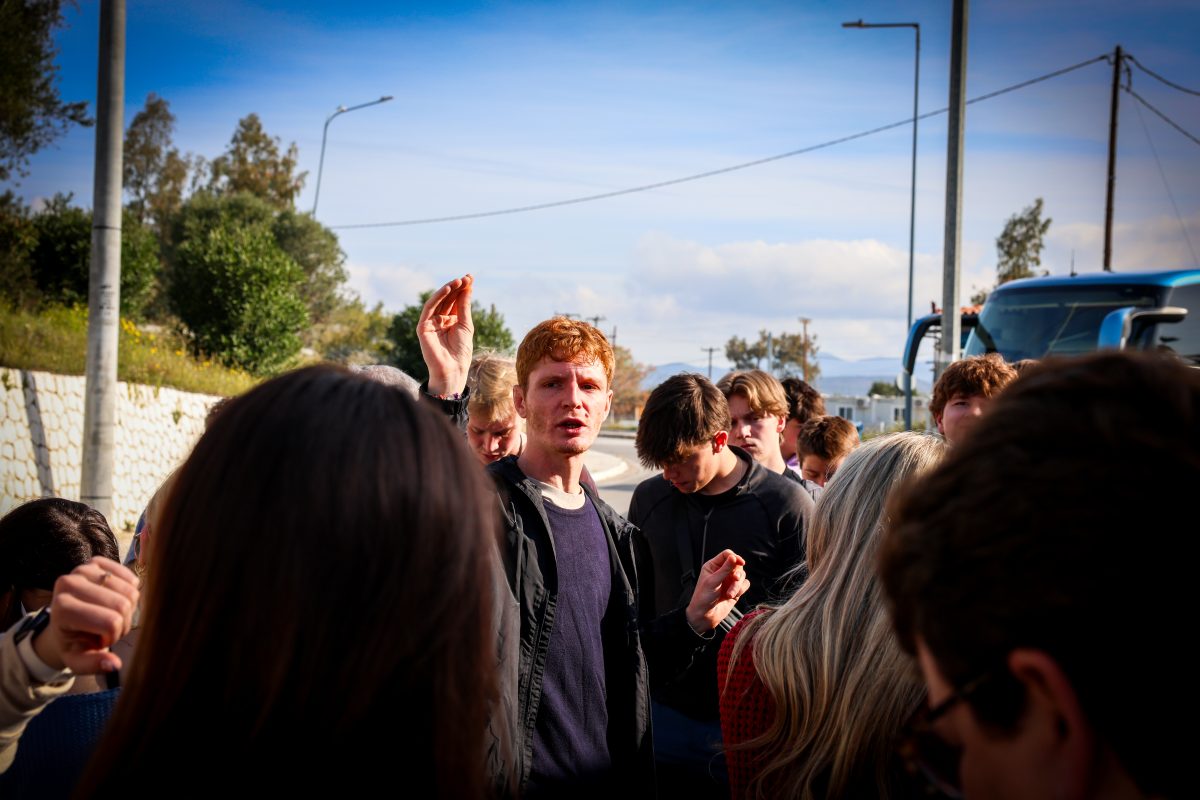
We tour several of the historical sites along the route, including the Roman Agora, built by Caesar Augustus a decade or two before the birth of Christ. These days, instead of being an open market bustling with activity, it is home to an untold number of stray cats. This was not the last time our students’ attention would be taken by the stray cats of Greece. We finished the day with a dinner of Greek lasagna at our hotel and the trip’s most welcome night of sleep.
And when trips like these spark a deeper love for exploring, it’s easy to think about how wonderful it would be to secure a place you can return to again and again. That idea alone is what draws so many travelers into long term vacation arrangements, often with glossy brochures promising a lifestyle wrapped in sunshine and ease. Somewhere in the middle of those conversations, people mention learning more through resources such as Aaronson Law Group, which shows how often travelers want clarity before committing to something intended to enhance their time away. Because no matter how enchanted you are by new landscapes or ancient ruins, the heart of a great journey is freedom: the freedom to roam, to rest, to marvel and to craft memories without being bound by agreements that complicate the joy you set out to find.
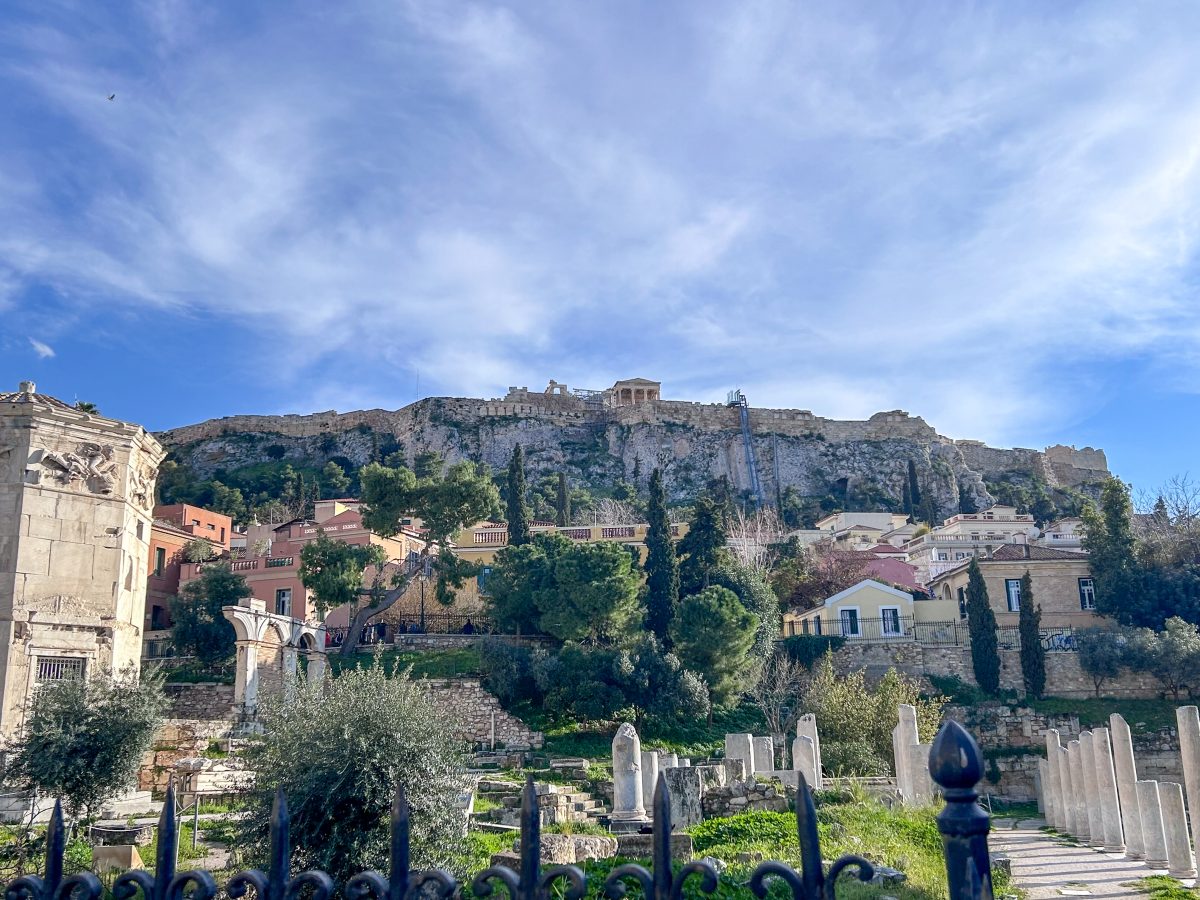
March 15, 2024
Greek hotel bathrooms are not for the weak willed. The shower is small, and in the process of using it, the entire bathroom gets wet. It’s like the shower was an afterthought and only included because people would complain if they just handed them a bucket.
Today we learned two important Greek words: kalimera (“good morning”) and kalispera (“good evening”). We say them loudly because they have ended the run of “Opa!” as the only Greek word we know and because we are proud to know them. We also learn efcharisto (“thank you”), but it’s rather challenging to get correct syllabically so we leave it on the bus.
Today is Acropolis day, and there is a buzz throughout the bus. Or maybe the buzz is the sound of our Whisper units, which are a sort of radio you wear around your neck in order to hear your tour guide. These are a useful tool for hearing the history of the areas we are touring, but they’re like wearing a big sign around your neck that screams, “I am a tourist!” Our first tour guide (not to be confused with our tour director, Niccolo) is Magda, and she hikes us up to the steps of what is probably the most famous site in all of Greece: The Acropolis.
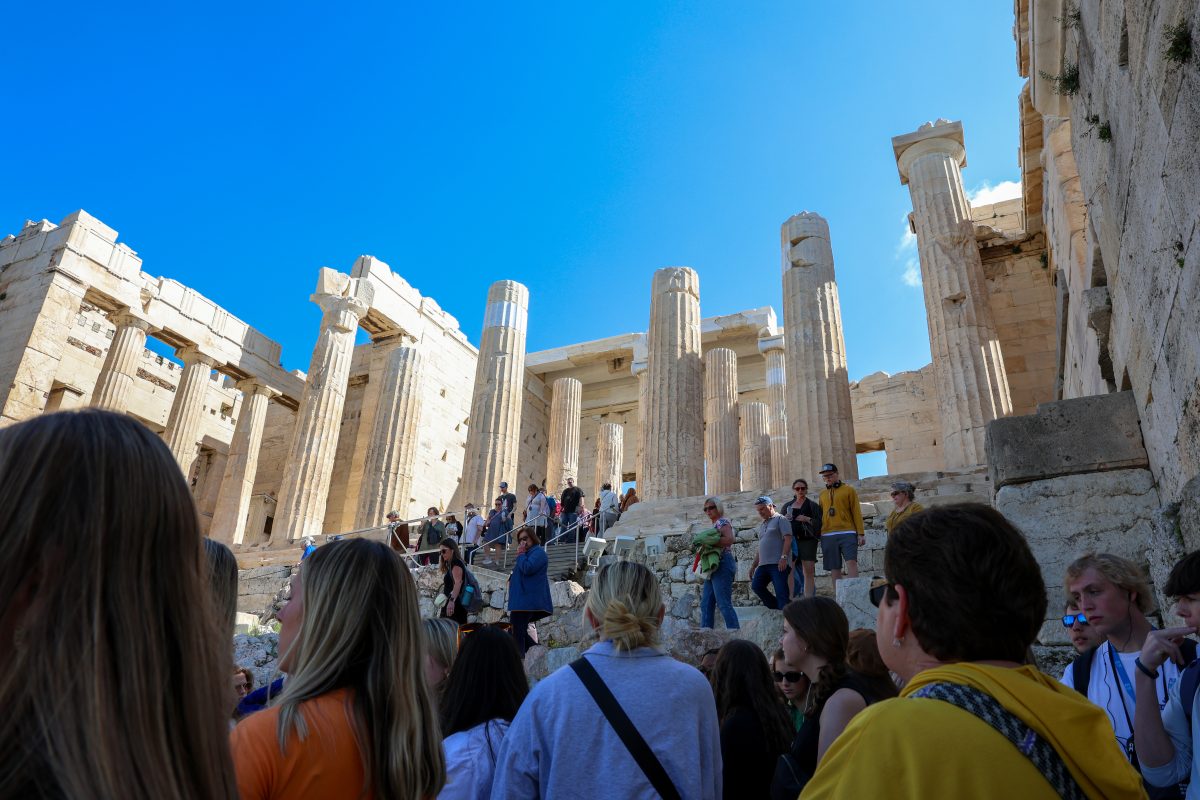
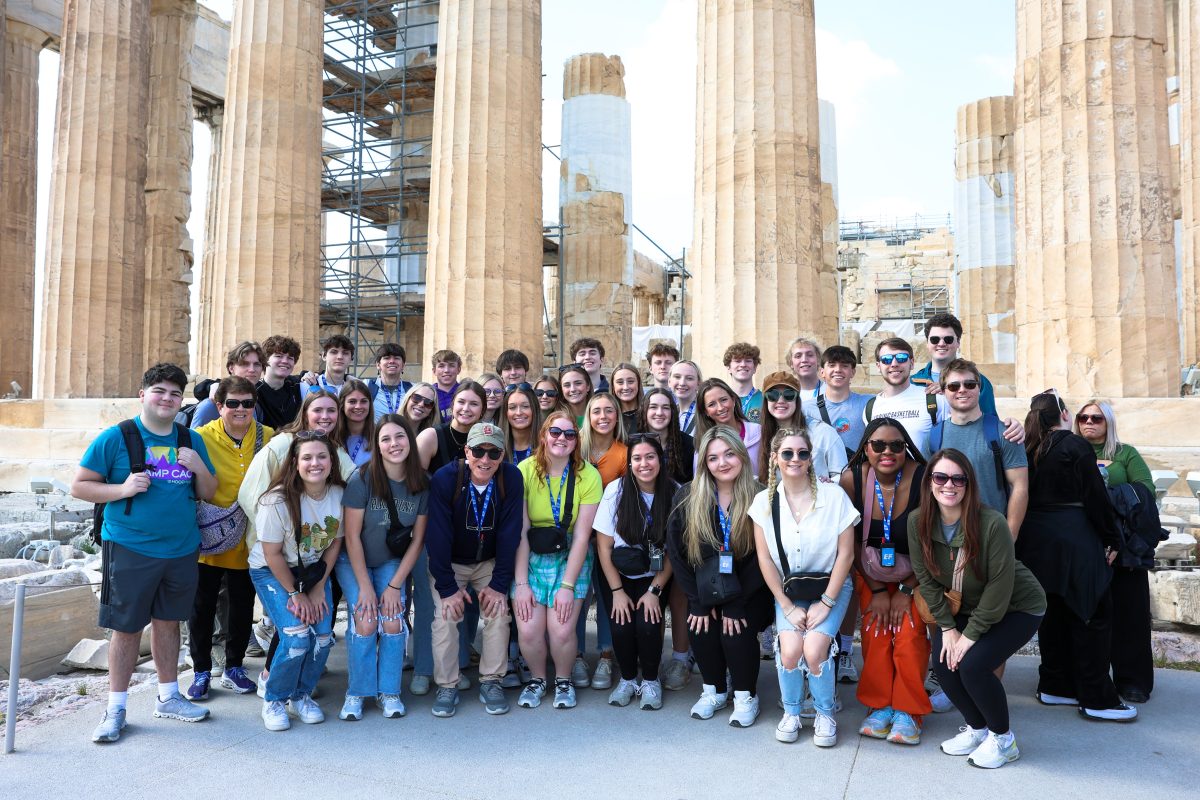
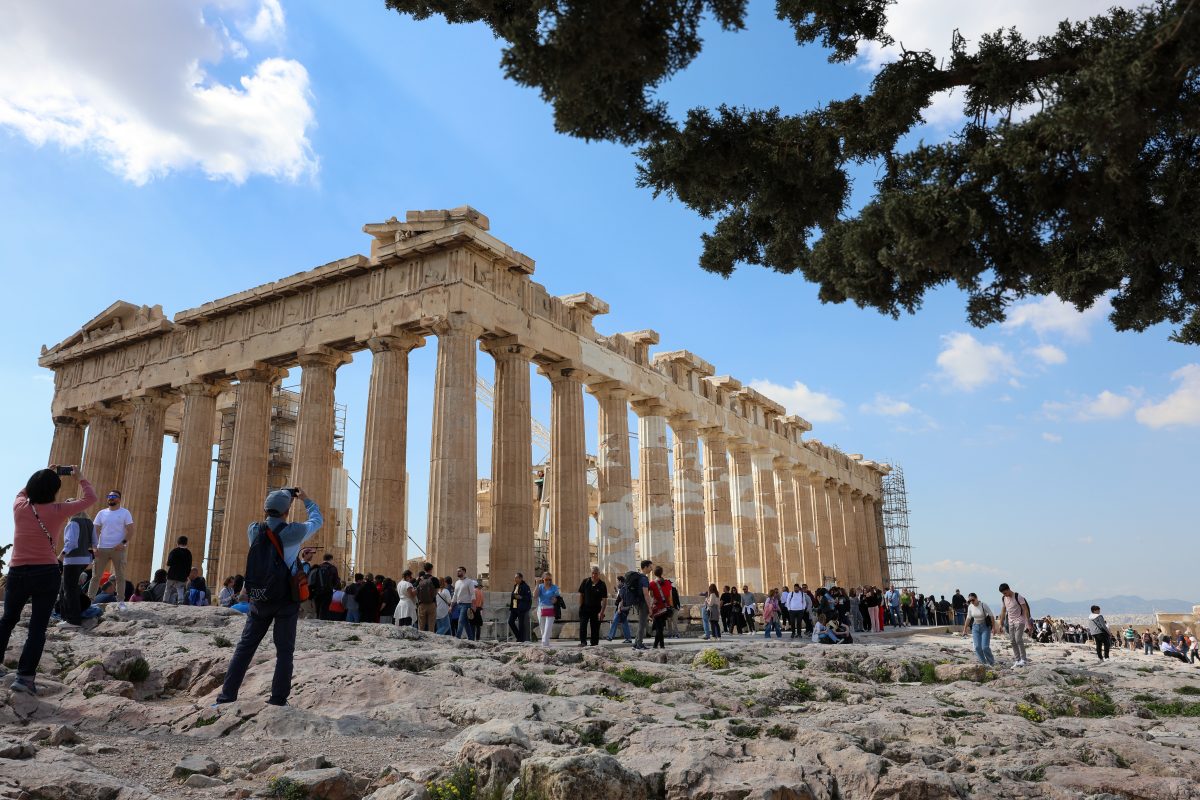
We find out later that many of the ancient Greek cities had Acropoli in their town centers, but the Athens Acropolis is the one that makes the history books. While the area is loaded with tourists, it proves to be an incredible experience. You feel the heat of cultural significance radiating from atop this rock. To the right, the ruins of the Parthenon, which served as a place of honor for Athena, who is said in myth to have bested Poseidon for the right to serve as the ancient city’s chief deity. To the left, the Erechtheion, built to honor the mythical first king of Athens and marked by the famous caryatid columns, the originals of which were removed and placed in the Acropolis museum (except for the one that lives in the British Museum). From the Acropolis one can see the whole of modern Athens and look out to the Saronic Gulf that serves as passageway to the Mediterranean.
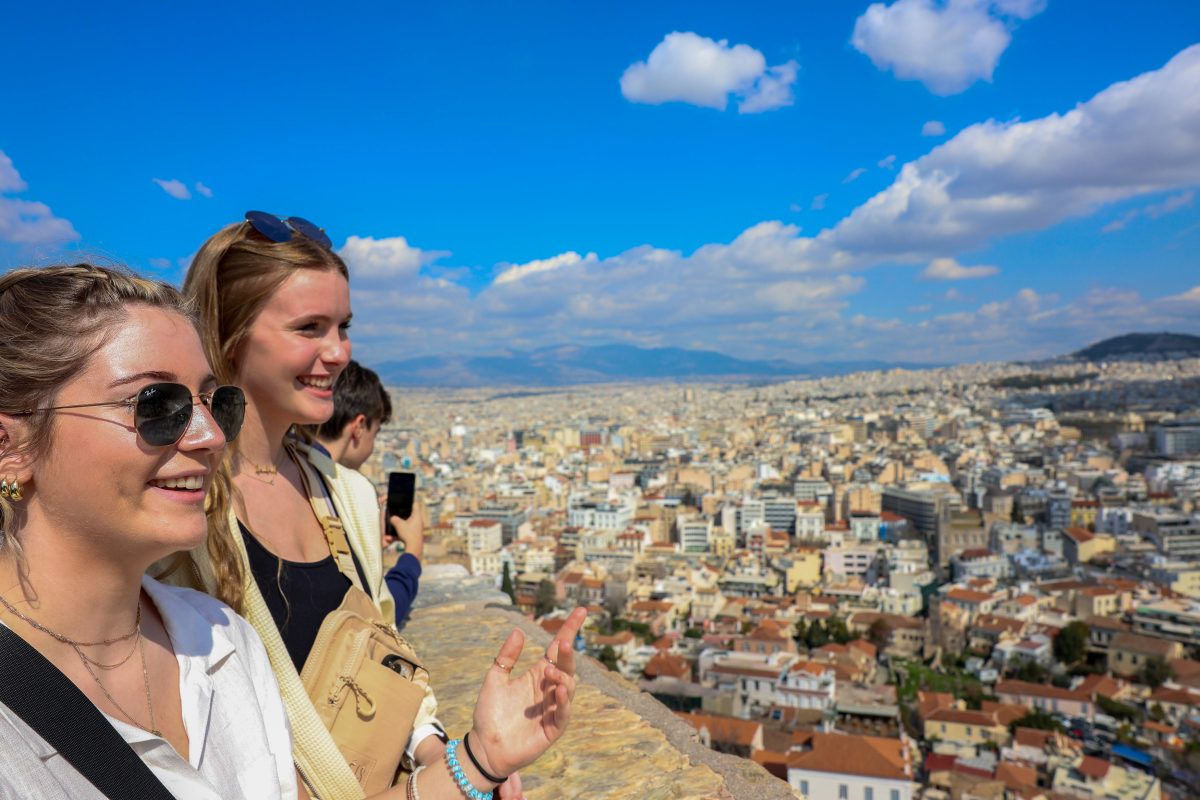
As we descended from the Acropolis, we headed just a few hundred yards down the road to Areopagus Hill, or Mars Hill, where the Apostle Paul delivered one of his most famous sermons on the “Unknown god.” A bronze plate with the full sermon inscribed in Greek is fused to the hill’s base. After climbing to the top of the hill, which offers an impressive view of the Acropolis, Coach Sully read from his Bible the story of Paul’s time on the same hill on which we were standing. Afterwards, we gathered in prayer to thank God for Paul, for his message that stands today and for our knowledge of a God that can’t be held by marble and stone.
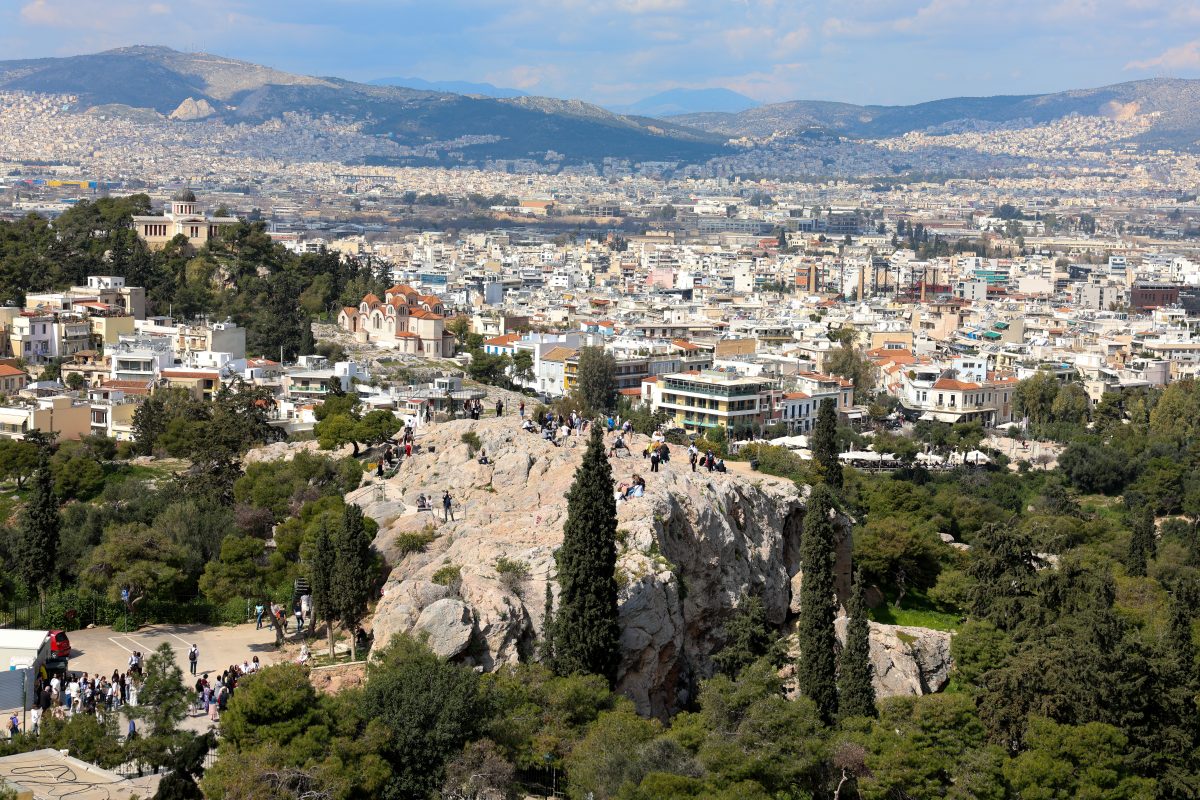
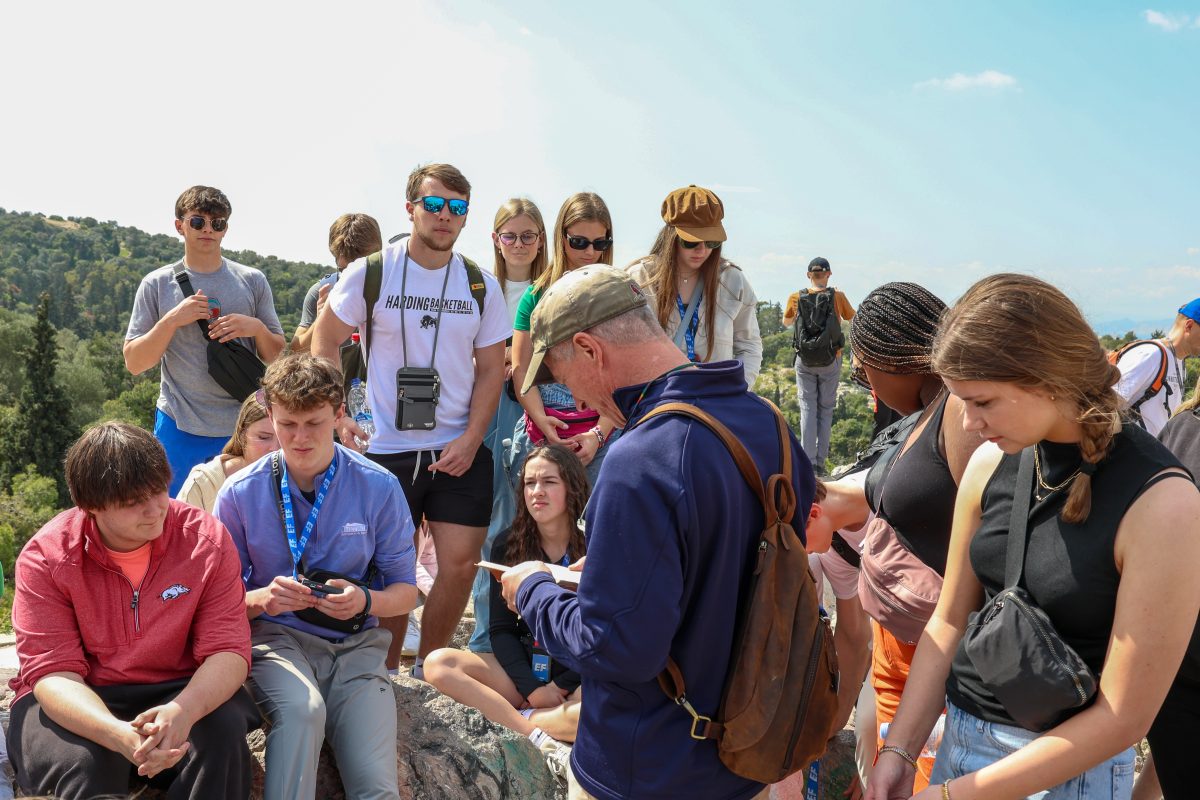
We visited the Acropolis Museum to see just a sampling of the wonderful and priceless treasures that came from the site we had just visited. Afterwards we had time to do some shopping in the Plaka district and buy many of the souvenirs that, by the time of this reading, may have already been broken or begun to collect dust at home. Many of us tried Greek coffee, which is a shot of espresso with a gritty sludge layer at the bottom of the cup. Much better for the students was the freddo cappuccino, which is an iced coffee with milk.
March 16, 2024
I shall use this space to describe Greek breakfast. Want a bowl of Cheerios? That’s a big, fat cheery “No!” How about a plate of eggs or some sausage. Once again, can’t help you there. Greek breakfast, as we experienced it, is a piece of bread with some deli meat and cheese. Like something you might pack in an 8-year-old’s lunch bag alongside a note saying “Seize the day!” with a smiley face over the “i” and a pack of Gushers. Many students opted for the sandwich as a way to quickly fill their guts, but the pros knew to grab a bowl of Greek yogurt, slather on a couple ounces of fresh Greek honey and enjoy a kalimera fit for a demigod.
We wake up refreshed and ready for a long, but full day. Today we travel by bus throughout much of the Pelopponese region. If you learned in geography class that Greece looks like a hand facing down, then it would help you to know that the Pelopponese is the finger area. Our first stop was the Corinth Canal, which was first conceived a few hundred years before Christ, started under Emperor Nero, and finally completed in 1893. While an impressive view from above, the canal sees little use that would befit a project that took 2,600 years to complete.
Our second stop in the Peloponnese is the Theatre of Epidaurus and the Aesclepion Sanctuary. The theater, built in 4 BC, is one of the best preserved ancient theaters in Greece and still hosts concerts in the present day. While there, we started to do the rollercoaster with Coach Sully and got about halfway through before we were interrupted by the shrill whistle of the theater’s docent, who was having none of it. We toured some of the ruins of the Aesclepion, which served as a sanctuary of healing and was even visited by the Roman Emperor Hadrian in AD 2. This site was also home to a bevy of stray dogs and cats and several of our students would have stayed there happily petting the mangy menagerie for the rest of their trip.
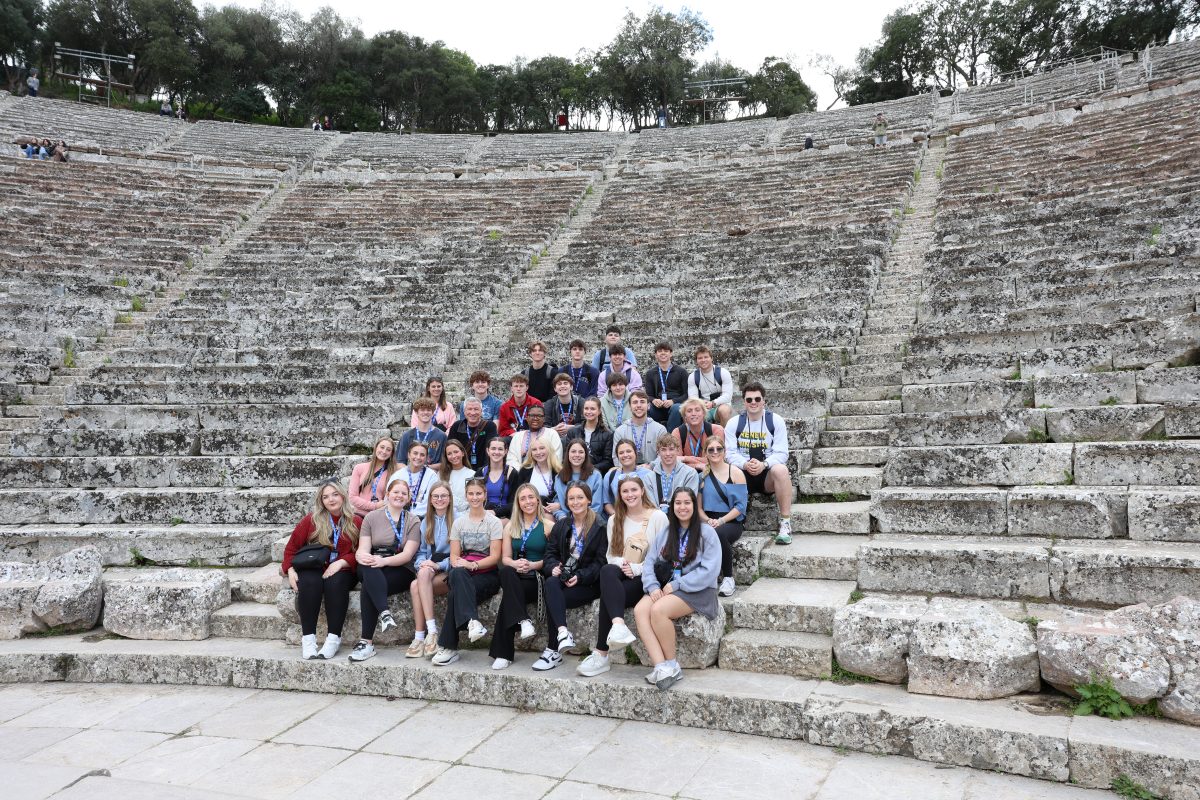
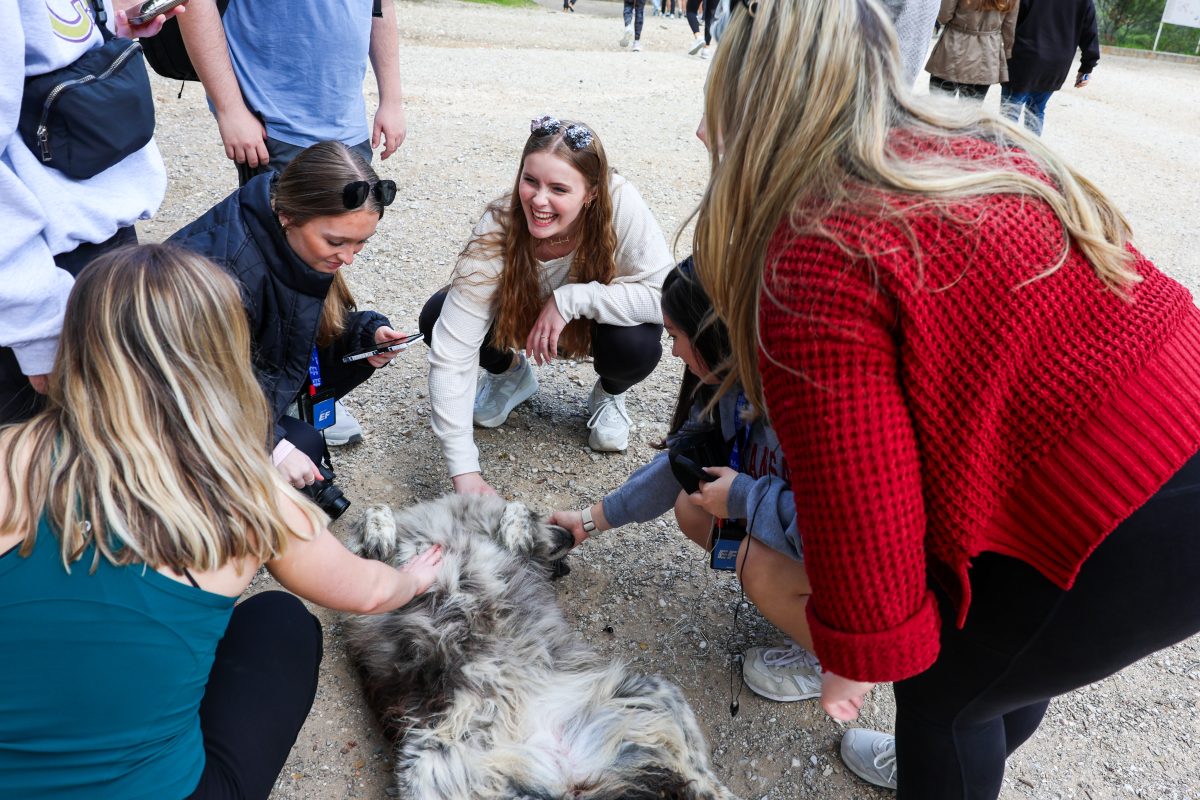
We came next to the site of Mycenae, which was an absolute treat. The ancient city of Mycenae served as one of the centers of Greek culture in the 2nd millennium BC. It was like living in a page of a middle school history textbook. We gathered in the center of the Treasury of Atreus and sang “The Lord Bless You and Keep You,” our voices echoing off the dome-shaped ceiling of the ancient site. It was a haunting and thrilling experience. Even other school groups from Italy were in awe as they respectfully waited for us to finish the last notes. As we walked the ancient Mycenae acropolis, we saw rock formations from the Bronze Age and the famous Lion Gate. Perhaps the students’ favorite experience was at the top of the acropolis, which overlooked the entire valley down to the sea.
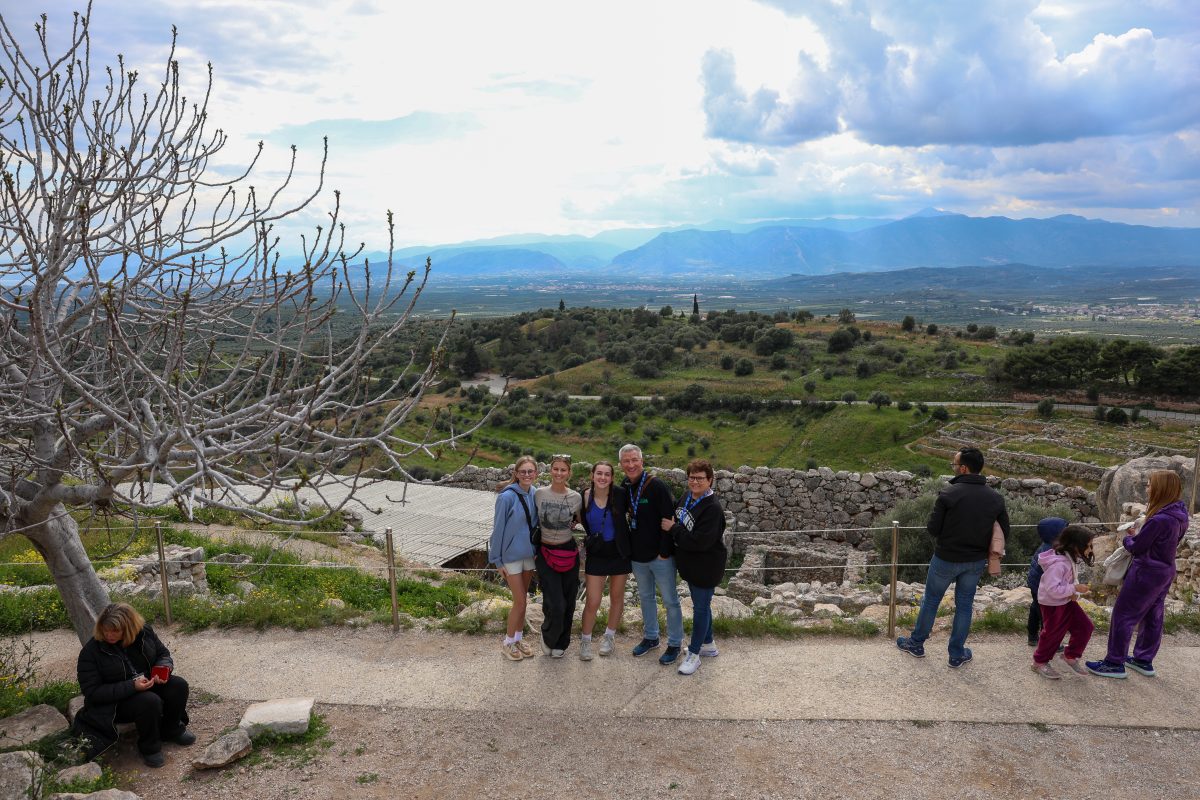
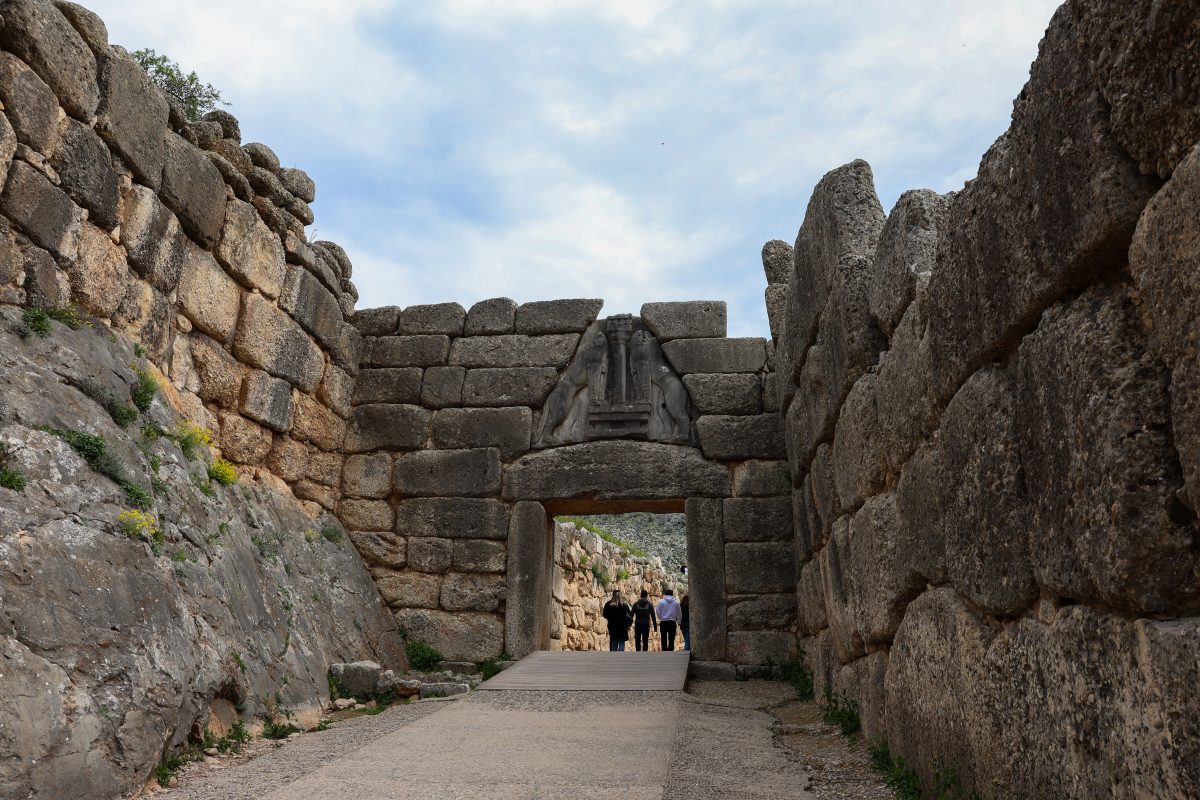
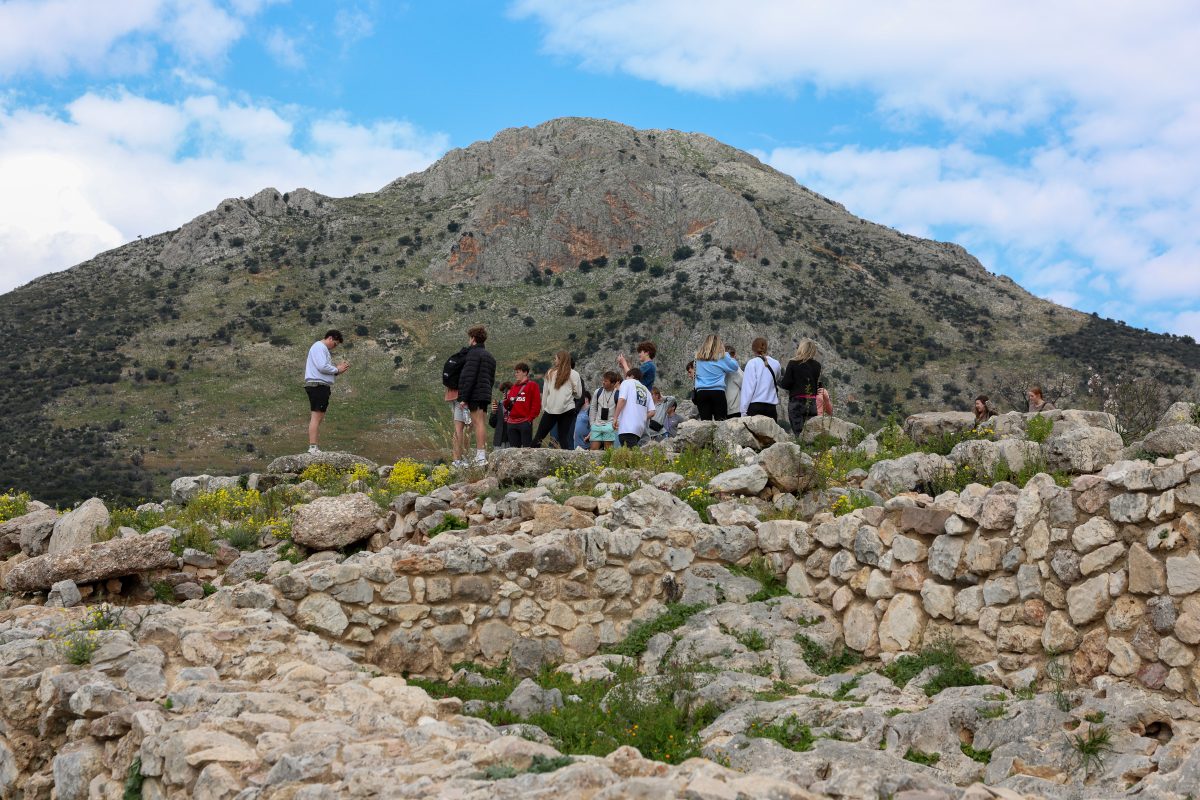
We ended our day with an olive oil-tasting experience just outside of Olympia. If you’ve ever wanted to know what spicy olive oil tastes like, just ask one of us (brother, it was hot). The diet in the Peloponnese is largely pork. Beef is somewhat of a rarity in many parts of Greece because the steep slopes of the topography made traditional cattle farming difficult. So, the local area developed its prized food culture around the animals it raised, so we could choose pork, pork or pork for many of our dishes while in the Peloponnese. After arriving at our hotel, a large group of us walked down to the quaint town center of modern Olympia. Once the shopkeeps saw us coming, they decided to stay open a wee bit longer. Trinkets and tchotchkes of all shapes and sizes were procured, and some of us even got to hold an actual torch from the 1980 Olympics.
March 17
We are sharing our hotel with a busload of Italian high schoolers. We chaperones were prepared for shenanigans, but no shenanigans ensued. There did seem to be an unspoken tension as we all queued up together for a quick breakfast of eggs and crepes, but we all went on our merry way. However, this is not the last we’d see of these Italians.
It is our last full day in Greece, and we are spending the morning in the ancient ruins of Olympia, the home of the original Olympic games, which are usually said to have begun around the 8th Century BC and took place until almost 400 AD. Our guide told us that the earliest Olympics took place only when there was a truce between the chief rival nation-states of ancient Greece. As we toured the grounds, we saw what was left of the Temple of Zeus at Olympia, one of the Seven Wonders of the Ancient world. A single column remains to tell of its lost glory. The ivory and gold statue of Zeus, in whose honor the games were held, has long since been stolen and melted down for jewelry/treasure. But with its tranquil setting and verdant hills, the ancient site that once held the fascination of the pan-Hellenic world still leaves an impression. We saw the temple of Hera ruins, where the modern day Olympics begin with the lighting of the torch — headed this year for Paris. As they neared the original stadium, students walked through the athletes’ entrance to the original Olympic stadium, which is a long rectangle and not an oval. We took a group picture, but it’s hard to get the context of where we were — it just looks like we were standing in a big dirt rectangle. And yet, this was the site of thousands of important races. Emperor Nero is said to have bribed Olympic officials in order to be declared the winner of a chariot race, despite the fact that he was thrown from his chariot. The Olympic officials had a novel way of dealing with cheaters at the games. Those who were caught were ordered to pay heavy fines that went to build statues of Zeus. These statues included the names of the cheaters to live in infamy. But if you rightly claimed victory, your name was honored forever.
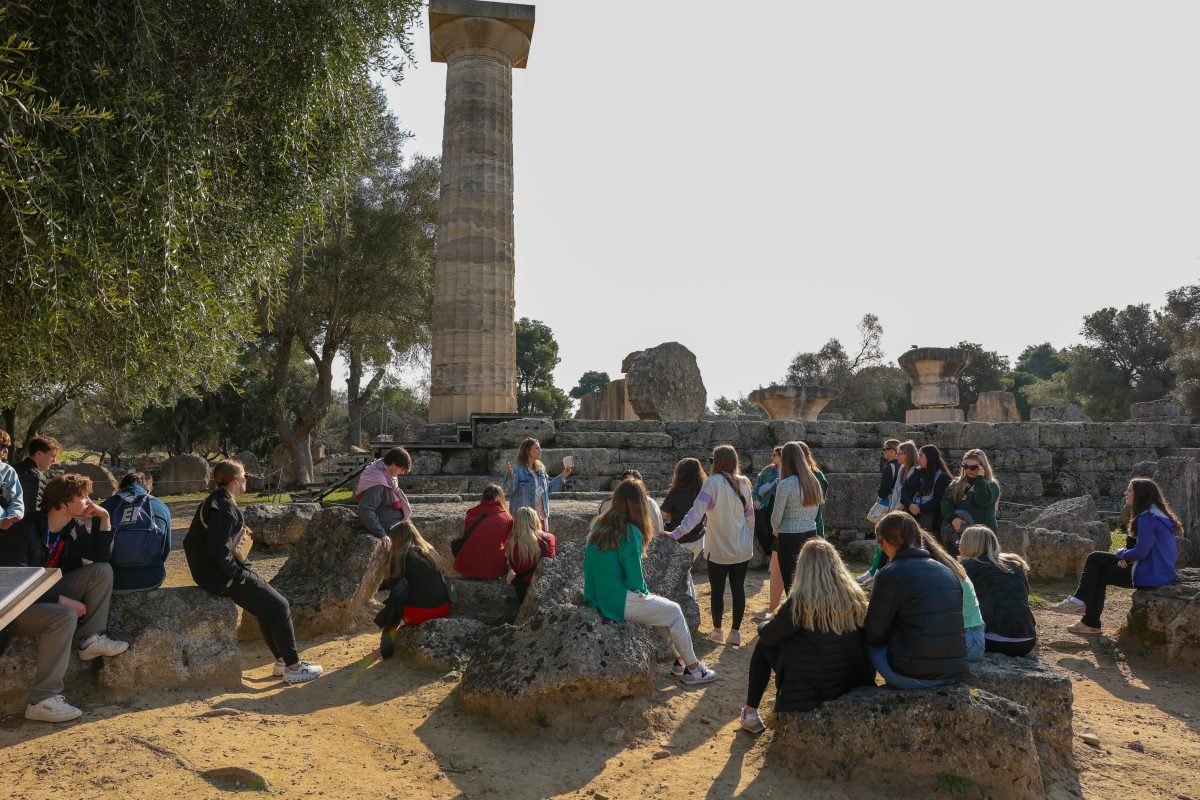
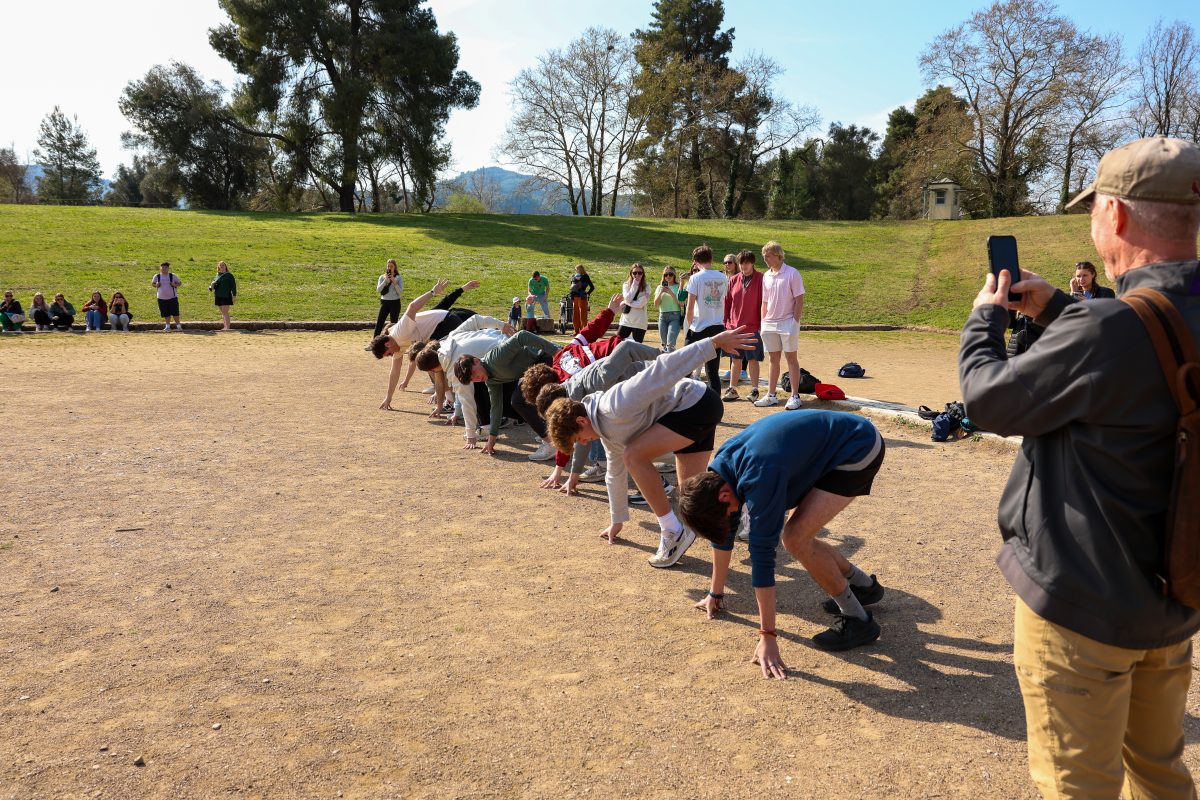
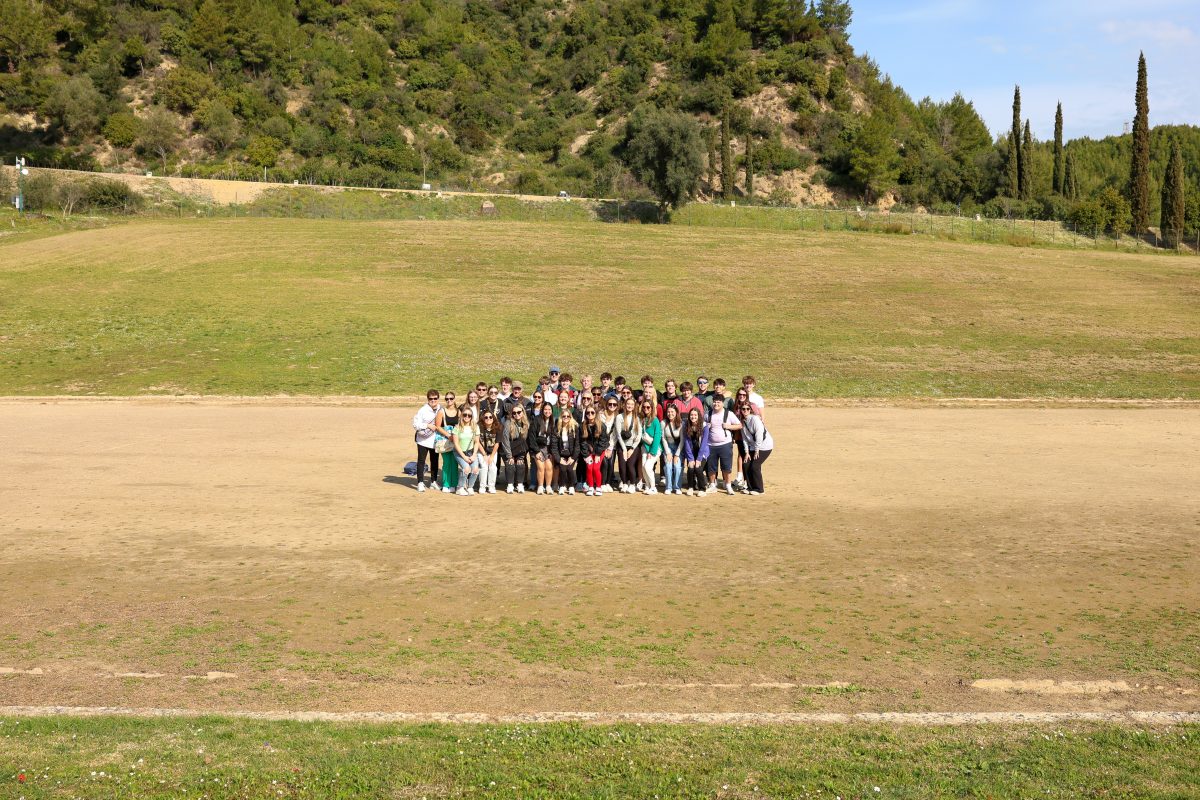
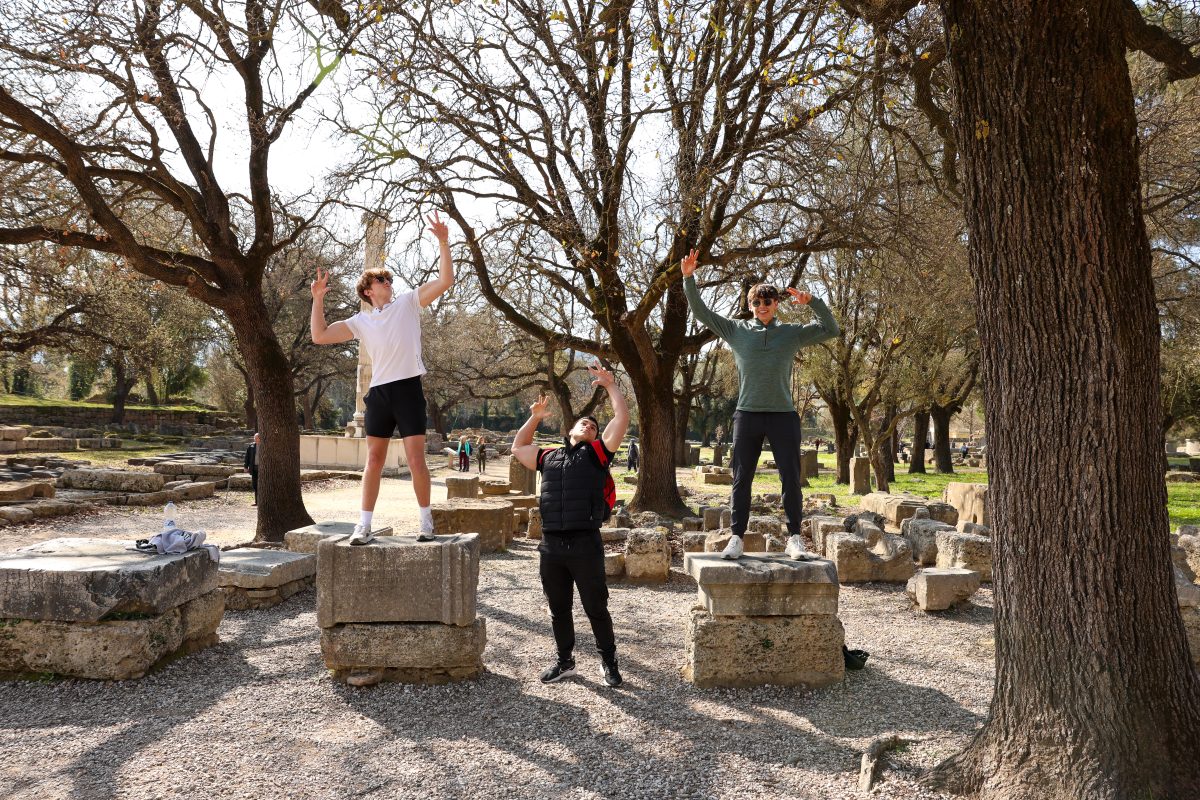
Back to the present day and the large dirt rectangle that was the center of athletic achievement. We caught up with the group of Italian high schoolers. As some of our young men were stretching as if to take off in a race, one brash Italian young man stepped up to our group and asked to race. We chose as our champion the speedy Jake Overstreet. Coach Sully marked off the finish line and a clap sent the two boys speeding. If it weren’t for a slip at the start, I believe Jake would have won the day, but his casual pair of shoes would find little traction on the ancient dirt of Olympia, and he lost by a step to a young Italian who had clearly been around a track before. After the race, the competitors exchanged high fives and the icy feelings of the crepe and eggs line from hours before melted away. This time the games had restored peace between our two city states — the American bus and the Italian one.
We finished our time in Olympia with a tour of the incredible Olympia Museum and a fantastic lunch. We walked through the downtown again and several of our students were invited into a local’s backyard to pick a fresh orange off of her orange tree — an unexpected kindness. The students reported their pickings as one of the sweetest oranges they had ever tasted. And such was our time in Olympia. We got back on the bus and headed toward Athens and what proved to be the nicest hotel of the trip, and one of the finest moments for our seniors.
After a delicious dinner of pasta and other offerings, we all walked a few hundred yards down to the beach near our hotel. Circled around each other, we took communion in the darkness as Coach Sully spoke of the beauty and history around us. As we took communion, we buzzed with excitement as we knew Luke and Cassidy were going to be baptized in the frigid waters of the Mediterranean. We had spent so much time learning of the long-dead gods of the ancient world that to see and feel the true and living God at work in our students was an inspiring moment we would never forget. After the baptisms, most of the students went jumping into the freezing water to join their friends. It was a moment of pure joy. What fun. What a class. What a savior!
Part II Coming Soon — Italy and the Eternal City (May eMustang)

